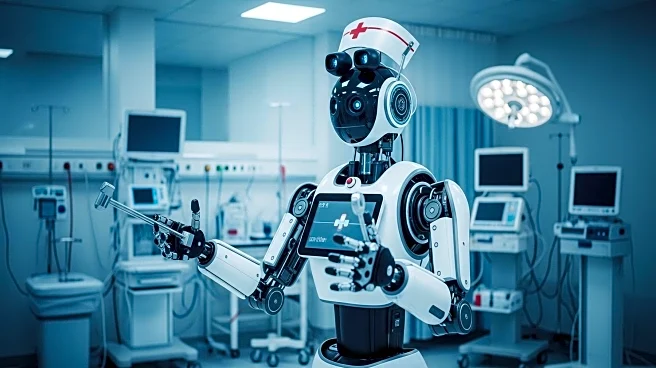What's Happening?
DataRobot is exploring the development of AI-powered nursing robots, such as Nurabot, to alleviate the workload of healthcare professionals. The robot is currently being piloted in Taichung Veterans General Hospital in Taiwan, focusing on wards treating lung, face, and neck diseases. Nurabot is designed to assist nurses with repetitive tasks like medication delivery and patient guidance, potentially reducing the daily nursing workload by 20-30%. This initiative comes in response to a global shortage of healthcare workers, with the World Health Organization predicting a deficit of 4.5 million nurses by 2030. The robot uses advanced AI and robotics infrastructure provided by NVIDIA, enabling it to navigate hospital environments autonomously and interact with patients and staff.
Why It's Important?
The introduction of AI-powered nursing robots like Nurabot could significantly impact the healthcare industry by addressing staffing shortages and reducing burnout among nurses. With an aging global population, the demand for healthcare services is increasing, putting additional pressure on existing healthcare systems. By automating routine tasks, these robots can free up healthcare professionals to focus on more critical patient care activities, potentially improving overall healthcare efficiency and patient outcomes. However, the integration of such technology also raises questions about patient preferences for human interaction and the need for infrastructure changes in hospitals to accommodate robotic systems.
What's Next?
Foxconn plans to commercially launch Nurabot in 2026, following its pilot testing phase. The robot will be integrated into daily nursing operations, including connecting to hospital information systems and running tasks autonomously. As the technology advances, hospitals may need to adapt their infrastructure to better accommodate robotic systems, ensuring safety and efficiency. Additionally, ethical and data protection protocols will need to be developed to address concerns related to AI in healthcare settings.
Beyond the Headlines
The deployment of AI nursing robots could lead to long-term shifts in healthcare delivery, potentially transforming hospital workflows and patient care models. As robots become more prevalent, there may be a need to reimagine hospital design to facilitate robotic movement and interaction. Furthermore, the development of ethical guidelines and data protection measures will be crucial to ensure the safe and responsible use of AI in healthcare.








